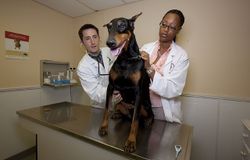Pet Emergency Experts Explain Common Causes & Treatments for Shivering in Dogs

As a pet owner, it can be scary witnessing your dog shiver or tremble for unknown reasons. Crescent Springs Animal Hospital, which serves the Greater Cincinnati and Northern Kentucky areas, says shivering in dogs isn’t always a cause for concern, but you should recognize when pet emergency care is needed.
To learn more about shivering in dogs, what causes it, and what can be done to help, read this guide put together by the caring veterinarians at Crescent Springs Animal Hospital:
What Is Shivering?
Any time you notice your dog shaking, they are likely experiencing a shivering or trembling episode. These episodes can resemble a shiver you may get when a sudden chill takes over your body, or they can be more ongoing, lasting several minutes or more at a time. In some cases, they may be continuous.
What Causes Dogs To Shiver?
Your dog may shiver, tremble, or shake for a variety of reasons. Some dogs demonstrate this behavior when they’re overly excited, like when they see you arrive home from work, or they tremble simply because of old age. However, trembling may mean something more serious is going on with their health, and you should take them to see a veterinarian right away for an examination.

If your dog suddenly begins shaking or exhibiting odd physical behavior, it could indicate a pet emergency. For example, some dogs who have sustained an injury and are in immense pain may shiver or tremble. If you notice symptoms like diarrhea, vomiting, limping, or obvious injuries to your dog, take them to a pet emergency hospital immediately.
Other common causes of shivering and trembling in dogs are distemper, which is caused by a virus, Generalized Tremor Syndrome (GTS), which is a condition where dogs shake for no reason, and toxic poisoning. Organ failure, seizure disorders, and some brain diseases can cause shakes, shivers, and trembles in dogs, so always have them examined by a veterinarian to ensure they’re not suffering from one of these health emergencies.
What Treatments Are Available?
After an examination by a veterinarian, your dog may require treatment to help manage their shivering and trembling, however, in non-serious cases like excitement, there’s little that can be done. For conditions like distemper, your dog’s vet may prescribe antibiotics, use an airway dilator, or recommend physical therapy. For conditions like organ failure and seizures, your dog’s veterinarian will determine the appropriate course of treatment after conducting a series of tests and a full physical examination.
To learn more about shivering and trembling in dogs, call the pet emergency experts at Crescent Springs Animal Hospital. Reach their clinic by calling (859) 331-6608, or visit their website to submit an appointment request and to see a complete list of the pet care services they provide.
About the Business
Have a question? Ask the experts!
Send your question

